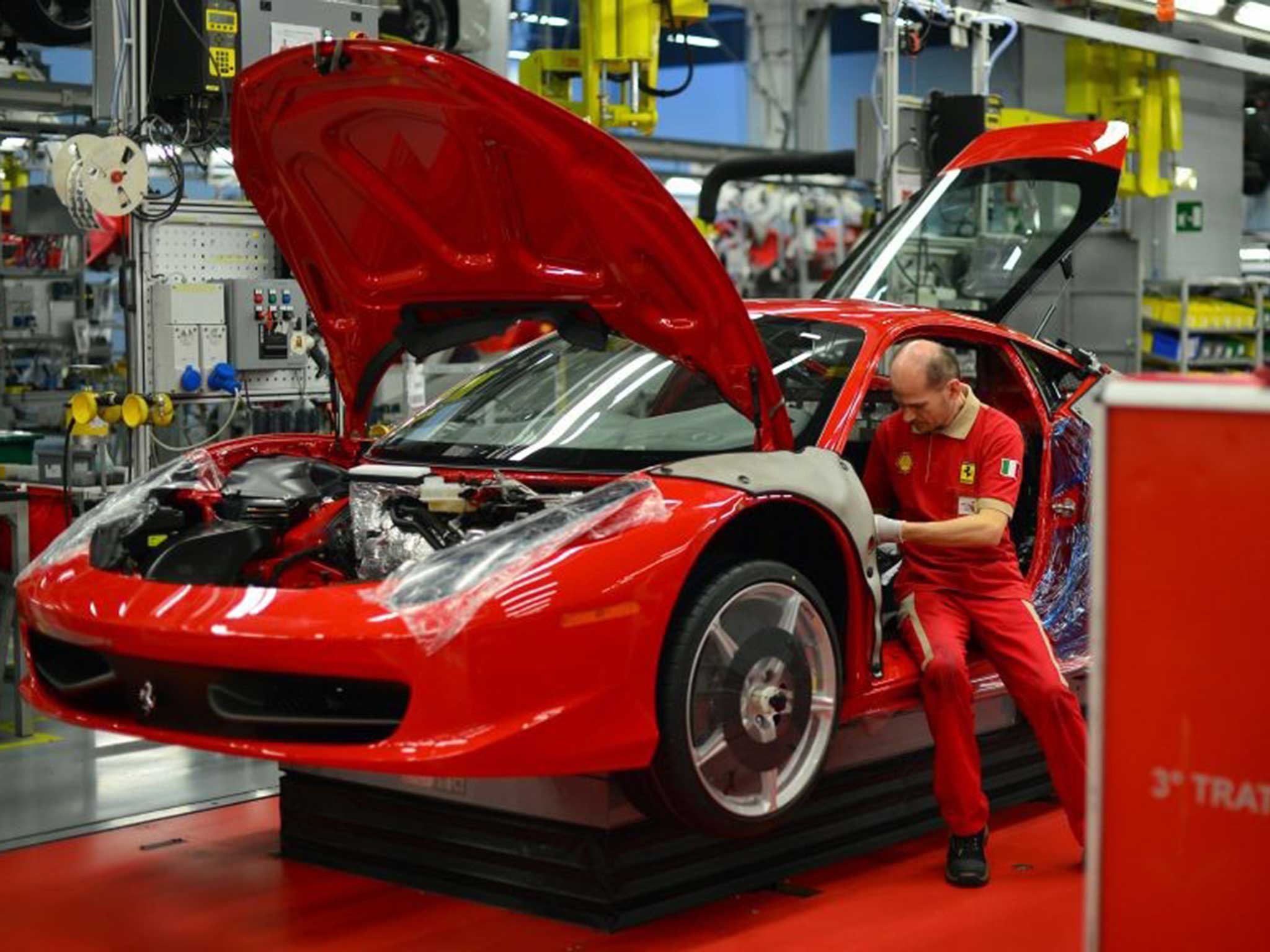Has Ferrari got lost driving to market?
As the Italian marque prepares to float, it is also ‘fleeing to London’ and putting its famous badge on products such as netbooks. Sean O’Grady asks if it risks losing its cachet

Like a newly enriched lotto winner taking a bend too fast in their new Ferrari F12 Berlinetta (740bhp, 0 to 60 in three seconds), the chairman of the Fiat Chrysler combine, Sergio Marchionne, is in danger of losing control of his most storied brand.
Preparing for what promises to be the most exciting automotive stock market listing since Jaguar back in 1984, Mr Marchionne says Ferrari is about so much more than mere cars: “I actually think cars are almost incidental to Ferrari … it sounds sacrilegious. But it is truly a luxury brand.”
The company is also set on a hazardous dilution of its “Made in Italy” credentials by shifting its tax residency from Maranello, in northern Italy, to Britain. “Ferrari Fleeing to London” was the headline in Milan’s il Giornale (Proprietor: S. Berlusconi).
All this really does seem sacrilegious, and dangerous too. A “stretching” luxury brand has long been the ambition of almost everyone in the business, but few seem to have succeeded. When, for example, was the last time you heard of someone wearing a Courvoisier necklace? Or indulging in a glass of Pierre Cardin wine?
Or working on an Acer Ferrari One netbook?
That’s just one example of the brand already exploring areas that make little sense. After all, even with some nice, bright red plastic cladding, a netbook remains a netbook – a fairly pedestrian piece of kit that isn’t going to make anyone feel particularly good about themselves.
Still, for about £400 you can have a new Ferrari, even if PC World’s admirably frank website describes it as “not very powerful for an ultra-portable” with a “battery life lower than a typical netbook’s”. Not much vroom there, then.
Yet the temptations are clear. Ferrari may be a famous brand – one of the most famous in the world – but, according to the consultancy Brand Finance, it only ranks 350th in value at around $4bn (£2.5bn). That’s a little below the State Bank of India and just ahead of Huggies.
With that Ferrari float in a matter of months, one can well understand Mr Marchionne’s attempt to add more value – and one can also see the appeal to parent Fiat, whose equity base has already been boosted by 30 per cent since the IPO was announced. Mr Marchionne claims Ferrari is worth around €10bn (£8bn); independent analysts put it closer to €5bn.
So what would these new Ferrari-branded goods look like? In fact, apart from the netbook, it already has a range of merchandise, comprising some borderline tat baseball caps and mock racing-driver outfits. There are also €399 carbon-frame Oakley sunglasses.
In this respect it’s in good company. Bentley, for example, offers some nice knurled cuff-links (just like the controls on a Continental GT); Porsche will sell you a toiletries case (bright lime green); and Lamborghini has a nice line in espresso cups.
Ferrari, though, is pushing the brand into uncharted territory: speculation suggests a hotel chain, presumably boutique, exclusive clubs and the like. The Ferrari World theme park – now in Abu Dhabi and soon in Barcelona – could go global.
These projects might well make some money, but it is difficult to know what, beyond some red paint and prancing horses, is distinctively Ferrari about them. And it might backfire. “If you think of the capacity of the Ferrari brand in the luxury space, there are many avenues you can take from a product perspective”, says Anil Valsan, an automotive analyst at the consultancy EY. “But at the same time you have to be very careful about not damaging the brand. It is absolutely critical that the brand’s value is not lost by diversifying into too many products.”
An easier solution for brand extension and value creation in the luxury car market has already been achieved by a number of marques – marketing smaller and cheaper (but still relatively exclusive) models. Perhaps the stand-out example is the Range Rover Evoque, but there are others. The Rolls-Royce Ghost is a tastefully scaled-down version of the mega-limo Phantom; Jaguar has a “baby” sports car; and Audi, BMW and Lexus are all selling into sectors previously dominated by mass-market brands. Ferrari sells around 7,000 cars a year, and is keen to keep them exclusive, but a modest widening of the clientele has done none of its rivals any harm.
Still, one way or another the Ferrari brand is going to be stretched and one wonders where it might all end – Ferrari staplers? Ferrari pasta sauce? Maybe a Formula One win – a real novelty item.
The Fast Show: How Ferrari took pole position
The first Ferrari emerged from the historic factory entrance on Via Abetone Inferiore in Maranello in 1947 – the brainchild and passion of the company’s founder Enzo Ferrari (pictured).
Born in 1898, he devoted his entire life to fast cars, first driving for Alfa Romeo and then leaving in 1939 to set up his own company on the eve of the Second World War.
In 1947, Ferrari’s 125 S racing car had its first-ever Grand Prix win in Rome – the first of more than 5,000 victories on the world’s tracks. To meet the growing market demand for his cars, Enzo sold Fiat a 50 per cent stake in the company in 1969, a figure that rose to 90 per cent in 1988, the year of his death.
The business struggled but revived its fortunes in Formula One in the early 1990s, and Michael Schumacher drove a Ferrari to five straight world championships between 2000 and 2004.
Join our commenting forum
Join thought-provoking conversations, follow other Independent readers and see their replies
Comments
Bookmark popover
Removed from bookmarks